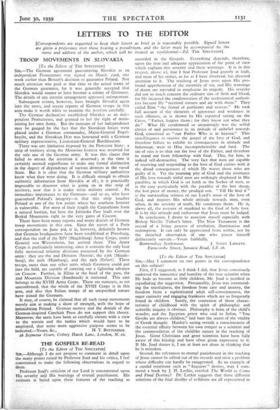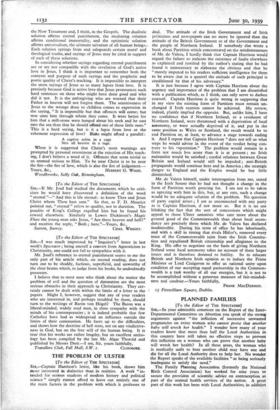[To the Editor of THE SPECTATOR]
SIR,—May I comment on two points in the correspondence on this subject?
First, if I suggested, as I think I did, that Jesus consciously endorsed the innocence and humility of the true scientist when He bade us become as little children, Mr. Joad is justified in repudiating the suggestion. Presumably, Jesus was commend- ing the trustfulness, the freedom from care and anxiety, the freedom from a sophisticated adult self-consciousness, the eager curiosity and engaging frankness which are so frequently found in children. Surely, the connexion of these charac- teristics of childhood with the spirit of philosophic and scientific inquiry is obvious. Philosophy is born of the child's wonder, and the Egyptian priest who said to Solon, " You Greeks are always children.," laid bare the secret of the vitality of Greek thought. Huxley's saying reveals a consciousness of the essential affinity between his own temper as a scientist and the commendation of the childlike nature in the teaching of Jesus. Great Christians and great scientists have been fully aware of this kinship and have often given expression to it. If Mr. Joad denies it, I am at least not alone in thinking that he is mistaken.
Second, the references to eternal punishment in the teaching of Jesus cannot be edited out of the records and raise a problem whose difficulty can hardly be exaggerated. As an example of a candid treatment such as " Inquirer " desires, may I com- mend a book by J. H. Leckie, entitled The World to Come and Final Destiny? Dr: Leckie suggests that three different solutions of the final destiny of evildoers are all represented in the New Testament and, I think, in the Gospels. The dualistic solution affirms eternal punishment, the mediating solution affirms conditional immortality, and the optimistic solution affirms universalism, the ultimate salvation of all human beings. Each solution springs from and safeguards certain moral and theological truths, and sayings of Jesus may be cited in support of each of these solutions.
In considering whether sayings regarding eternal punishment are or are not compatible with the revelation of God's active love in Jesus, I think it is important to remember both the contexts and purpose of such sayings and the prophetic and poetic quality of Christ's teaching. It is impossible to interpret the stern sayings of Jesus as so many lapses from love. It is precisely because God is active love that Jesus pronounces such hard sentences on those who might have done good and who did it not. It is the unforgiving who are warned that their Father in heaven will not forgive them. The sensitiveness of Jesus to the wrongs done to children comes to expression in the saying, " It is impossible but that offences will come; but woe unto him through whom they come. It were better for him that a mill-stone were hanged about his neck and he cast into the sea than that he should offend one of these little ones." This is a hard saying, but is it a lapse from love or the vehement expression of love? Blake might afford a parallel: A captive robin in a cage Sets all heaven in a rage.
When it is suggested that Christ's stern warnings are prompted by personal resentment at the rejection of His teach- ing, I don't believe a word of it. Offences that seem trivial to us seemed serious to Him. To be near Christ is to be near the fire—the fire of love, which is also the fire of judgement.—











































 Previous page
Previous page